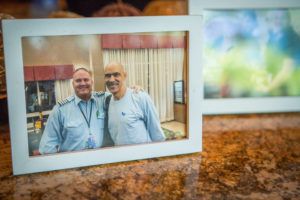As a pilot, Will Smith glances down thousands of feet and sees the big picture: people small as ants, neighborhoods arranged in tidy grids. The world has an order from this height, a predictable pattern. Not long ago, he’d arranged life that way too—building a family and a solid career. He was, in his words, “living the dream.” And then life shifted into an uncontrollable nosedive.
“I never thought I would be put in the situation I wound up in,” he says. “But there I was, falsely accused and in prison.”
When that false accusation changed his flight plan, he’d been working as an aviation instructor. Employed by US Airways, he felt solid and fulfilled; married, he was raising two boys. Then came divorce. Less time spent with his boys. A rape allegation. Smith was exonerated, then re-indicted, then exonerated again. It felt, he says, as if his world was coming to an end.
“I spent 26 months in prison for a crime I didn’t commit,” he says. “I’ve seen some bad things.”

He also found the impetus to fight to regain what he’d lost—and more. Today, Smith owns and operates Will Smith Aviation, which provides private charter flights to and from Tampa. Smith trains pilots and advises corporate clients who acquire aircraft, and he’s built a successful business arranging flights for clients such as Tony Dungy.
And that circuit judge who sentenced him? Smith found plenty of evidence of other wrongful convictions she’d handed down throughout the years. From prison, he presented his findings and the judge was given a choice: either resign or be forcefully removed from the bench and lose her pension. The judge chose to resign. Smith couldn’t regain the two years he’d lost during incarceration. But he could let his experience spark change.
Besides operating a thriving business, his goal now is to help those wrongly convicted or recently released from incarceration. He founded the Will Fund to help provide legal help for those who don’t have the financial ability to argue their innocence. He’s also a tireless advocate for measures that reduce recidivism, a published author and a motivational speaker.
“Don’t judge a book by its cover,” he says. “It’s easier to point a finger at someone else than to take responsibility.”
By responsibility, he specifically means that those released from prison have the odds stacked against them. He uses his own experience as an example. Read his book, Ditches to Riches, and it becomes readily apparent that the process from ruin to success was anything but easy for Smith. He believes this experience, this struggle, to be a universal one.
“I wrote that book to show people that success is possible after a setback,” he says. “You have to take a strong look at yourself, set that goal and take steps to fulfill it.”
That’s exactly what he did. And Smith tempers his “nothing comes easy in life” admonition with a strong willingness to help. It’s why he works with the Tampa Bay re-entry program. He advocates for former inmates to receive education and learn a trade, advises former prisoners to climb out of that proverbial “ditch” and, if a job isn’t readily available to make one. Society, he believes, needs to embrace the real-life lessons shared in Ditches to Riches.
“I’ve noticed that a lot of people who are successful forget where they came from,” he says.
Helping change the trajectory of the imprisoned, upon release, is good for society at large—and more. Smith points to the cost of housing prisoners and wonders where that money could be channeled to better the world.
Though he does recommend that prisoners treat Ditches to Riches as a sort of guidebook for the future, pivotal Smith tenets can apply to anyone. They include:
• If you can’t find a job, make one. After he left prison, a neighbor loaned him $5,000 to start a pest control company. He grew that sum to $250,000.
• Recognize a revolving door for what it is. Many former prisoners don’t know that they can apply for a Pell Grant, he says. Construction is often the type of work prisoners find after release, but it’s not a definite end-all.
• Don’t expect instant gratification. The title, Ditches to Riches, isn’t an exaggeration, he says. Often, it takes starting at the bottom to reach the top. Succeeding is difficult; it’s also possible.
• Fix yourself first, before entering into a relationship. Know what you want and don’t be distracted. Have that goal in mind.
“No matter how hard your situation is,” he says, “you can rebuild and rebound.”
A second book Smith authored, Falling From the Sky, tells the story of how he went from respected pilot, to accused, to ultimately seeking exoneration from within a state prison. It’s a real-life roller coaster ride, but also a testament to his resilience.
The story began with a single mother, a son who loved baseball and attended private school. That son grew to embrace restaurant management and all its responsibilities; he’d open a Tampa tanning salon in 1998, count that as a learning experience and then, move to North Carolina to raise a family. He saw an advertisement for flight school on a billboard and followed inspiration to a career.
What came next, as they say, is history. But as he likes to tell audiences, that doesn’t need to define a person. Working with the Sheriff’s Department, he will continue to advocate for those who seek to acclimate to society after serving prison time.
In the meantime, he is in the screenwriting phase of movie development for a film based on his life. Smith’s flight plan is fulfilling these days. He came through a crash and emerged intact. And he wants to spread the message that the incarcerated, innocent or not, can lead vital lives. ♦

We are very excited to have Will Smith on our team here in the Tampa area.
Interesting story! It’s a prime example of human will and dedication digging in to overcome adversity!! We are making a movie out of it!